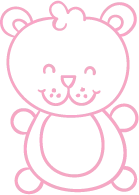
We are delighted to present Curriculum 2.0, designed to nurture every child’s growth through a well-rounded, developmentally appropriate learning approach.
At the heart of our curriculum is the 7-Petal Approach, which continues to enrich each child through meaningful, play-based activities every day. Building upon this foundation, our commitment remains unwavering—to nurture children as they bloom, enriching each of the seven petals to help them spread their unique fragrance.
Our award-winning curriculum is meticulously researched, and scientifically designed to foster holistic child development. Through play-based activities and collaborative group work, we provide children with a strong academic foundation using a multi-sensory, integrated approach to education.
Some of the key objectives of our award winning preschool curriculum include:

To enable, energise and enhance childhood by fostering all round growth

Sequential learning techniques to ensure development of key skill areas

To ensure that children receive attention to their physical, mental and emotional needs.





Developmental Milestones are markers to measure a child's growth in areas of cognitive development, motor skills development, language development and socio-emotional development. They help us in understanding how children develop and differ from one another in their growth patterns. Milestones support the understanding that every child is unique and develops at his/her own pace. Natural development milestones are helpful in selecting the best age appropriate programs and activities for children.

Our student-to-teacher ratio is 10:1 to ensure individual attention and care for each child.
We believe in maintaining a transparent and continuous dialogue with parents. At Little Millennium, we offer regular updates through structured parent-teacher meetings, detailed weekly progress reports, and access to a dedicated mobile app. The app allows parents to track their child’s activities, milestones, and overall development in real-time, reinforcing our commitment to collaborative, family-centered education.
Our scientifically curated daily schedule balances structured learning, creative exploration, and physical activity. Children engage in a blend of focused academic sessions, free play, outdoor experiences, artistic activities, and rest periods. This combination supports the development of cognitive, social, and motor skills, while also promoting emotional well-being. Our schedule is designed to follow the brain's natural learning rhythms, ensuring optimal engagement and retention.
To cultivate a well-rounded development, we offer a wide range of activities integrated in our curriculum like music, dance, yoga, art and sports. These activities are not just for fun—they play a vital role in enhancing creativity, improving physical coordination, fostering emotional expression, and building social skills. Each activity is carefully designed to align with brain-based learning strategies, providing a multi-sensory experience for optimal engagement. We also provide a wide range of exposure to our children through the year, by creating opportunities for children to participate and perform in various celebrations, monthly and annual events, to nurture their skills and tap their talent.
We have meticulously aligned our good preschool curriculum with the primary school syllabus, emphasizing core competencies in literacy, numeracy, and social skills. Through play-based learning, structured academics, and socio-emotional development, we ensure that children leave preschool confident, curious, and academically prepared for the challenges of primary school. Additionally, our brain-based learning strategies emphasize cognitive flexibility, problem-solving, and emotional regulation—critical skills for success in formal schooling.
Our approach to teaching writing is informed by research in fine motor development and early literacy. We begin with activities that build hand-eye coordination and pencil grip, progressing to tracing, letter formation, and eventually word and sentence construction. By using multi-sensory techniques like sand trays, finger painting, and kinesthetic learning, we make the writing process engaging, stimulating, and enjoyable for young learners.
At Little Millennium, we nurture a love for reading through daily interactive storytime, guided reading sessions, and access to a rich library of age-appropriate literature. Our teachers use expressive reading techniques and encourage children to explore books independently, fostering both language development and a lifelong passion for reading. The environment is designed to stimulate imagination, vocabulary acquisition, and early comprehension skills.
By the time children graduate from our preschool, they have a strong foundation in phonics, letter recognition, word formation, and basic sentence writing. We continually assess their readiness through structured evaluations, tracking their progress against both national and international early literacy standards. Our curriculum of pre-primary education is individualized approach ensures that each child moves forward at their own pace, building the skills necessary for success in primary school.
For children requiring additional support, we offer personalized learning interventions. Small group sessions and one-on-one instruction, coupled with research-backed strategies such as phonemic awareness exercises and motor-skill-building activities, help struggling learners improve their reading and writing abilities. We also engage parents with resources and strategies to reinforce learning at home.
Yes, our curriculum is meticulously aligned with the academic and developmental standards required for admission into top K12 schools. We emphasize both academic readiness and the development of key social and emotional skills, ensuring that children are well-prepared for entrance assessments and interviews. Our holistic approach fosters not just academic success, but also resilience, curiosity, and a love for learning.
We provide a structured and supportive environment that mirrors the routines and expectations of K12 schools. Interactive group activities, foundational skill-building, and socialization exercises help children develop the cognitive and emotional maturity necessary for the next stage of their educational journey. Additionally, our curriculum includes components like time management, classroom behavior, and peer collaboration to ensure a smooth transition.
Absolutely. Our students receive a comprehensive preparation for K12 entrance exams, with a focus on key areas such as verbal reasoning, logical thinking, early literacy, and numeracy. We do offer required exercises and parenting sessions to ensure our children are confident and well-equipped to meet the challenges of entrance exams.
We support parents throughout the K12 school admission process by providing workshops, guidance on school readiness, and mock interview tips for both children and parents. Our experienced team helps you navigate the application process, offering personalized advice on selecting the right school based on your child’s strengths and interests.